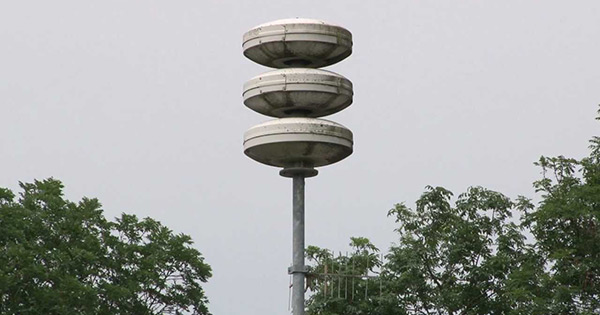Dutch Emergency Siren Test – First Monday of the Month

Did a terrifying wailing siren just disturb your peaceful Monday morning? Was everyone else around you strangely calm during it? Did it suddenly stop with no explanation? Was it the first Monday of the month at noon? If so, then don’t panic! It’s just a test.
In fact, this test happens every first Monday of the month at noon. It takes place simultaneously across the entire country. Wailing sirens can be heard from the biggest city to the smallest village.
“What’s The Emergency Siren Used For?”
The sirens might be a great way to identify tourists and newly-arrived expats (by the look of panic in their eyes during the test) but this is not their primary function.
In reality, their intended use is to warn people about emergency situations. These emergencies can be anything from a countrywide event to a localized problem. It has been used to warn people about fires, toxic smoke, flooding, extreme weather conditions, other natural disasters, public disturbances and more.
Let’s just hope that a real emergency never happens on the first Monday of the month at noon. Otherwise, no one would realize something was really wrong until the flood drowned us, the meteor struck us or the rampaging dinosaur ate us.
Joking aside, the monthly test lasts for about 90 seconds. If it goes on for longer the emergency is real.
If you are wondering what the emergency siren/alarm sounds like (or you just like that sort of thing) click here to hear it. Keep in mind that the sirens used to be much louder than they are today.

“How do I find out what is going on?”
In the event of a real emergency the official advice is to go inside, shut all doors and windows and turn on the television or radio for further instructions and updates.
Luckily, in more recent years an NL-alert system has been added which pushes warnings messages about emergency situations to people’s smartphones (along with a distinct tone). It’s very useful at giving more information about the situation and the best course of action. I once received a message about a nearby fire in our village that warned us to close all our windows to keep the toxic smoke out. The NL-alert system has also been used to warn people about overcrowding at sporting contests and other events.
The new NL-alert phone system gets tested twice a year. The intention is for it to fully replace the siren system sometime in the near future (current estimate is 2021).
Having Fun with Scary Sirens
The idea of a countrywide (or even local) disaster happening might be terrifying. However, for most people living in the Netherlands, the monthly emergency siren tests are just a normal part of daily Dutch life. It does not worry people who are familiar with them. But…
For people who’ve never heard the test before it can be a confusing and slightly worrying 90 seconds. It might be a bit evil but you can have a lot of fun with someone who does not know what is going on. Here are a few things you could say to a new arrival the next time the siren test sounds (before you explain the whole thing for real).
- “That’s to remind me to take my medication.”
- “Dam, I left the oven on.”
- “Somewhere, (insert name of bad Dutch singer here) is performing.”
- “That’s the English alarm. An Easy Jet flight must have just landed at Schiphol airport.”
- “That happens every time Febo sells 100 kip burgers.”
- “Time to put your clogs on… it’s the law.”
- “What, that? No, that’s nothing… Incidentally, if anyone asks, I was with you all night.”
- “Oh no. They just finished cleaning up the last Zombie apocalypse. I hope the road cleaners don’t go on strike again this time.”
- “It’s the expat-man signal. Someone needs my help. Up, up and away.”
- “Quick, hide me! They’re hunting expats again! Please, I don’t want to be a frikandel!”
- “Oh dear… The Dutch supply of cheese just ran out.”
- “Oh no, it’s the Sinterklaas alarm! If we don’t make an offering of our naughty children quickly he will take his rage out on all of us!”
- “What sound? I don’t hear anything.”
Emergency Siren – Just The Facts
- The sirens test takes place on the first Monday of each month at noon unless it falls on a national or religious holiday or remembrance day.
- The monthly test lasts for about 90 seconds. If it goes on for longer there is a real emergency.
- There are about 3,800 sirens located around the Netherlands.
- The first version of the system was set up in 1939 during the Second World War. It was used to warn Dutch people about incoming air raids.
- Monthly tests originally started in 1952 during the cold war but ended in 1989 when the Berlin wall fell.
- The Warning and Alert System as we know it today started operation in 1993 with renewed monthly tests.
Read about more things like this in 19 Strange Dutch Habits and Customs.












Good post, was wondering what the hell that siren was :D
I remember in the sixties they were still sounded every Friday noon time and to hail in the New Year along with every church bell. Also the sound was continuous, so (“dus” for Stu) they must have changed the sound. I have never heard this one, as I live in England, but find it confusing as a Dutchman, like they can’t make up their mind whether it’s an emergency or not.
That sounds like a gibbon harmonization and they all go HOUUUUUUUUUUUUUUUUUUU